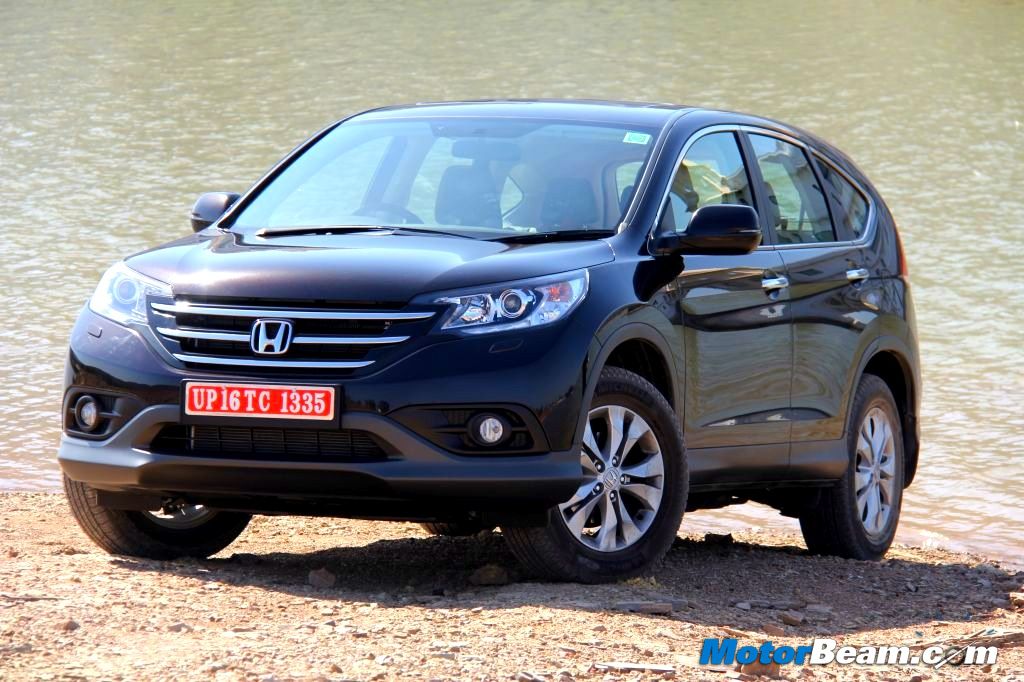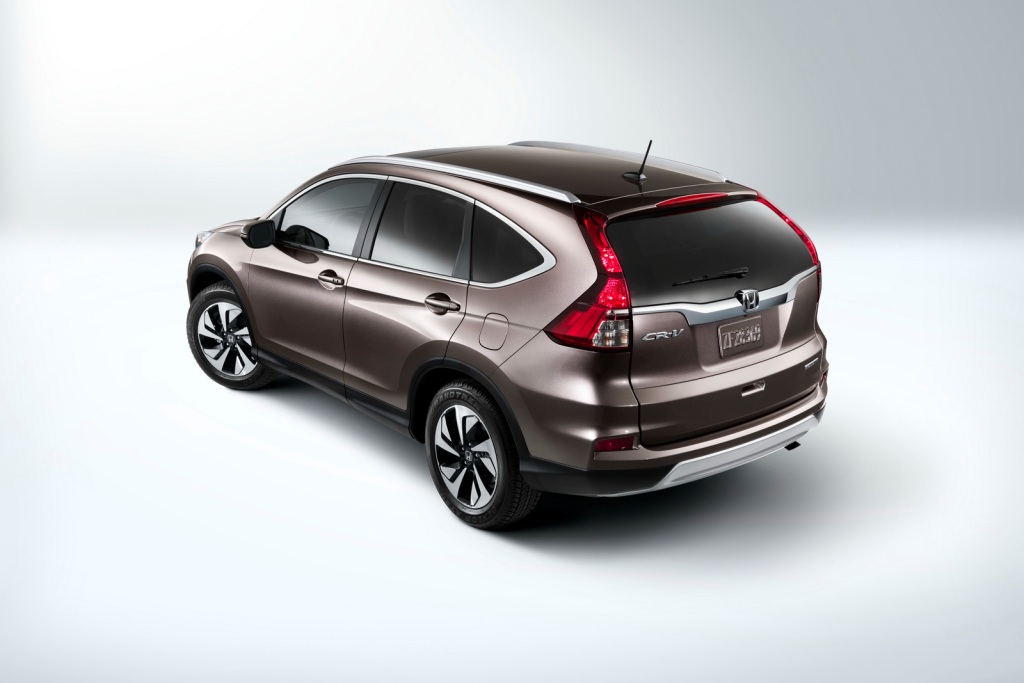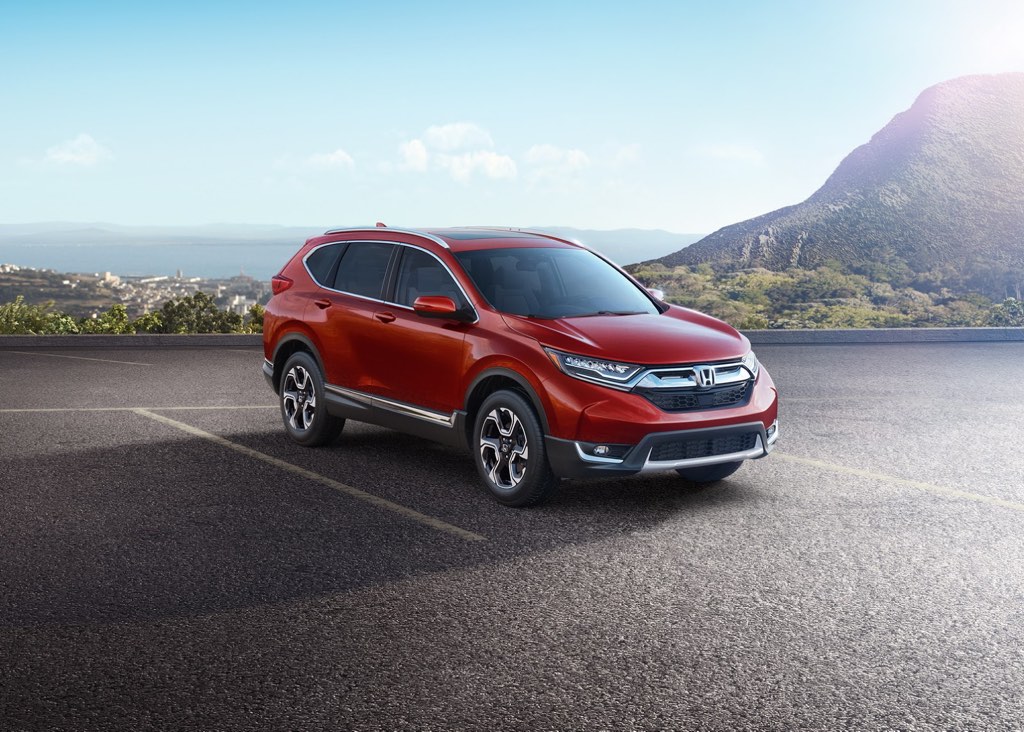
Honda CR-V Review
Car Tested: 2013 Honda CR-V
Price OTR Mumbai: Rs. 23.92 – 28.59 lakhs
The new Honda CR-V impresses with its comfortable spacious interiors and sedan like driving dynamics.
The Honda CR-V has already seen two generations in India. The concept of a comfortable roundabout vehicle (CR-V) first came into production in 1995 when the first generation Honda CR-V hit the roads in Japan. The second generation model made its way into India in 2003 and since then this vehicle has developed quite a fan following. Right from the beginning, the Honda CR-V has never set the sales chart on fire but there is no denying what a fantastic vehicle it is. Now Honda aims to make a good car even better by offering the next generation CR-V in India. Will the fourth generation make waves again? We find out around the beautiful country roads of Rajasthan.
[flickr size=”center” float=”medium”]http://www.flickr.com/photos/motorbeam/8455597042/[/flickr]
Exteriors – The fourth generation design of the Honda CR-V is more evolutionary and the basic DNA has been retained, which is a good thing. The silhouette remains pretty similar to the outgoing model. The wheelbase is exactly the same as the old Honda CR-V but changes include a reduction in length by 30 mm and the roof is now 5 mm taller. This has translated into more space in the cabin. The front end gets an aggressive new chrome grille and the swept back headlamps incorporate HID headlamps with washer. Two tone body coloured and black grey theme looks sporty with the bulging wheel arches magnifying the SUV character. The black grey theme runs all around the vehicle.
[flickr size=”center” float=”medium”]http://www.flickr.com/photos/motorbeam/8455599610/[/flickr]
The sides flaunt the 17-inch 10 spoke alloy wheels and the all new shark fin antenna does not go unnoticed. Large windows get a chrome surround all over and give an airy and large feel to the occupants. The new Honda CR-V is more distinct behind the C-pillar. The triangle shaped quarter glass and new 3D tail lamp design enhances the sporty appeal.
[flickr size=”center” float=”medium”]http://www.flickr.com/photos/motorbeam/8454504335/[/flickr]
The rear profile flaunts a curving rear windshield which grows on you with time. The top end 4WD version has its own badging on the lower right corner of the boot lid and also gets an electric sunroof.
[flickr size=”center” float=”medium”]http://www.flickr.com/photos/motorbeam/8455600458/[/flickr]
Interiors – Step inside and the Honda built quality speaks for itself. Fit and finish is fantastic and quality of materials used is rich. The dashboard of the Honda CR-V gets a wooden insert to break the continuity. Similar to the previous generation CR-V, the gear lever is mounted on the dashboard which has a nice silver surround around it. Silver accents are also present on the steering wheel and doors. The dashboard also gets a 6.1 inch touch screen display (top variant only) which works as a display for navigation, Bluetooth streaming, telephone, etc. It also works with the reversing camera and lights up once the car is slotted into reverse. At the extreme front is another 5-inch display which works as the MID displaying fuel consumption, audio status, etc.
[flickr size=”center” float=”medium”]http://www.flickr.com/photos/motorbeam/8454507379/[/flickr]
Seating is comfortable and the leather upholstery looks and feels premium in the Honda CR-V. The drivers seat gets an 8-way electronic adjustment feature. The range of driver’s seat height adjustment and tilt/telescopic adjustment is much more in this new model. Overall, the front and rear seats offer comfortable seating with good knee room and back support, however, both fall a wee bit short on under thigh support. Headroom is more than sufficient for the tallest of passengers. Interior space is more than the third generation model. Despite of the same wheelbase, Honda has managed to squeeze in more space by mounting the seats lower than before. The cargo area is more spacious too and loading bay is also much lower enabling easy loading of luggage. The spare wheel is a full sized tyre mounted on the same 17-inch alloy wheel.
[flickr size=”center” float=”medium”]http://www.flickr.com/photos/motorbeam/8455601064/[/flickr]
The fourth generation CR-V gets a lever in the cargo area used to operate the dive down rear seats. One lever is placed on either side to drop the rear bench into a flat floor.
[flickr size=”center” float=”medium”]http://www.flickr.com/photos/motorbeam/8454506553/[/flickr]
Rear seats folded, the CR-V can swallow two full sized mountain bikes. Even with the rear bench upright, there is abundant room to stow luggage for your favorite weekend getaway.
[flickr size=”center” float=”medium”]http://www.flickr.com/photos/motorbeam/8454506341/[/flickr]
Dual zone air conditioner with automatic climate control works well to chill the cabin in literally no time. Vents are provided at the rear so that the rear passengers don’t feel left out. The audio system has decent sound quality with audio controls are provided on the steering wheel. One can play music through CD/DVD, USB, iPod or can just stream it through your phone via Bluetooth. The steering wheel also houses controls for cruise control and telephone. The top end automatic versions also get paddle shifts. The USB cable lies in the centre armrest between the front seats and two 12V charging sockets have been provided.
[flickr size=”center” float=”medium”]http://www.flickr.com/photos/motorbeam/8454507663/[/flickr]
The instrument cluster is not only stylish but easy to read too. To encourage Eco friendly driving, the ECO ASSIST System has illuminated arcs that light up with green and white colours indicating whether the vehicle is being driven in an efficient style. White colour signifies inefficient driving while green means an efficient driving style has been adopted by the driver.
[flickr size=”center” float=”medium”]http://www.flickr.com/photos/motorbeam/8455599526/[/flickr]
In an effort to minimize the carbon footprint, Honda has incorporated a new ECON operating mode. The ECON button is situated on the right side of the steering wheel. Once activated, it will reduce fuel consumption by adjusting the performance of the engine, transmission and the air conditioner. Safety is an important aspect of motoring and Honda has offered many features on this front. The new Honda CR-V is loaded with 6 airbags, ABS, EBD, VSA (Honda speak for ESP), whiplash mitigation front seat design and HSA (Hill Start Assist), which prevents the vehicle from rolling backwards on an incline when the driver switches from the brake to the accelerator. HSA is only available in automatic variants.
[flickr size=”center” float=”medium”]http://www.flickr.com/photos/motorbeam/8455597402/[/flickr]
Performance – Honda is offering two engine options on the new CR-V. Both the engines have been carried forward from the earlier version with few tweaks to enhance power and performance. The 2.0-litre SOHC i-VTEC petrol engine (front wheel drive) pumps up 156 PS of peak power at 6500 RPM and a torque of 190 NM. Power is up by 13 PS over the older model. Mated to this engine is an option of either a 6-speed manual transmission or a 5-speed automatic. Our test car was fitted with a 6-speed manual gearbox. Gear shifts are smooth and slick and the ratios are suited towards both highway and city driving styles. Power delivery is linear with a strong mid and high range. The low-end of the rev meter is strictly average. Overtaking on the highways may need you to work down a few gears but it should not be a problem. The ARAI certified fuel efficiency of this engine is 13.7 km/l and we reckon this engine can deliver around 8 km/l in the average Indian driving cycle. NVH levels are good but the engine does make itself heard near the redline.
[flickr size=”center” float=”medium”]http://www.flickr.com/photos/motorbeam/8454502603/[/flickr]
The 2.4-litre DOHC i-VTEC petrol engine churns up 190 PS of peak power at 7000 RPM, a good 29 PS more than the previous generation car. Torque figures top out at 226 NM at 4400 RPM. The 2.4-litre engine feels apt for the CR-V. Power and performance, both are better and this engine feels quicker too. Our test car was mated to a 5-speed automatic transmission with paddle shifts to turn up the fun. Floor the pedal and in the regualr D mode, there is a lag before the cogs work themselves to place. If you are in any urgency, the paddles are the fastest way to work up or down the gears. Get into the sports mode and the CR-V will only upshift once it hits the rev limiter. This engine sounds more sporty of the two and gives out a typical but soothing Japanese whine, typical of the Honda’s. The ARAI certified mileage stands at 12 km/l but on extremely hard driving, the MID read 5.5 km/l. Drive with a light foot and you can extract around 7 km/l. The convenience of an automatic is well worth the difference in the fuel efficiency between the manual and automatic. A diesel mill, if offered would have been a dream come true.
[flickr size=”center” float=”medium”]http://www.flickr.com/photos/motorbeam/8455595774/[/flickr]
Our test car was the 4WD version which has Honda’s Real Time 4-wheel drive system. In simple terms, the system supplies power to the front wheels only under normal operation and switches to 4WD when the system detects any slip from any of the wheels. We got a first hand experience of this function when we tried to enthusiastically slide the car over gravel. The 4WD kicked in almost immediately preventing the wheel spin and generating more grip instantaneously.
[flickr size=”center” float=”medium”]http://www.flickr.com/photos/motorbeam/8454501337/[/flickr]
Driving Dynamics – Honda primary focus with the CR-V has been comfort and the fourth generation does not disappoint at all. Ride is plush and the suspension is happy absorbing the craters on the road, ensuring the passengers have no reason to complain. Suspension tuning tilts more towards comfort and even on the worst of roads, the undulations won’t transfer down your spine. Driving is very much like a sedan and bodyroll is at an absolute minimal. Honda has switched to an electronic power steering (EPS) in the latest model, dumping the hydraulic unit for good and moving towards a more eco-friendly solution. The steering is therefore light and this adds to the sedan like driving character and zipping through traffic is as easy as running a knife through butter. Come high speeds and this EPS unit does not weigh up well and feels a bit numb, however, at no instance does the CR-V feel unstable. Even at tripple digit speeds, this crossover feels well planted on the road and high speed stability is impressive. Driving comfort deserves a special mention, even after driving 350 odd kms, we were as fresh as a daisy with no hint of fatigue.
[flickr size=”center” float=”medium”]http://www.flickr.com/photos/motorbeam/8454503815/[/flickr]
The brake pedal feels a bit soft but all 4 disc brakes and ABS along with EBD ensures that the Honda CR-V stops dead in its track with confidence. No dramas at all. The Michelin 17-inch 225/65 tyres offer sufficient grip to lug this beast. The new Honda CR-V has better NVH levels than the outgoing model. This has been done by increasing body rigidity and having better suspension isolation properties. Furthermore additional noise insulation has been used and the more aerodynamic design not only reduces the wind sound but also aids in improving fuel efficiency.
[flickr size=”center” float=”medium”]http://www.flickr.com/photos/motorbeam/8454502063/[/flickr]
Verdict – The all new Honda CR-V has evolved into a much better product all around. The new model offers more room in the cabin with a comfortable driving experience. The feature list has only got longer and you get everything a SUV buyer wants, well almost. Though the new Honda CR-V is a great all rounder, it still lacks what most wish for in the segment, a diesel engine. Though Honda has not ruled out a diesel mill for the CR-V in the future, the current model will sport petrol engines only which could be a turn off for prospective customers in a diesel dominated market. However, with petrol and diesel prices heading towards each other, you never know what happens. For now, lets give credit where its due, Honda has managed to better the CR-V brand in every possible way. This new Honda is available, for the first time, through the CKD route resulting in reduced prices, making it more convincing than it was earlier.
Lack of a diesel engine option may dent sales of the new Honda CR-V, what is otherwise a brilliant product by Honda.
[flickr size=”center” float=”medium”]http://www.flickr.com/photos/motorbeam/8455596284/[/flickr]
What’s Cool
* Ride quality
* Interior space
* Built quality
What’s Not So Cool
* No diesel engine
* Fuel Efficiency
[flickr size=”center” float=”medium”]http://www.flickr.com/photos/motorbeam/8454507573/[/flickr]
2013 Honda CR-V Specifications
* Engine: 1997cc, SOHC, i-VTEC; 2354cc, DOHC, i-VTEC
* Power: 156 PS @ 6500 RPM; 190 PS @ 7000 RPM
* Torque: 190 Nm @ 4300 RPM; 226 Nm @ 4400 RPM
* Transmission: 6-speed manual, 5-speed automatic
* Top Speed: 200 km/h
* Fuel Consumption: 7 km/l; 8 km/l
* Fuel Type: Petrol
* Suspension: McPherson Struts, Coil Sprint (Front), Double Wishbone, Coil Spring (Rear)
* Tyres: 225/65/17 Tubeless Radials
* Brakes: Ventilated Discs (Front), Discs (Rear), ABS, EBD
* Safety: ABS, EBD, HSA, VSA, Six Airbags
2013 Honda CR-V Dimensions
* Overall length x width x height: 4545 mm X 1820 mm X 1685 mm
* Wheelbase: 2620 mm
* Front/Rear Track: 1565/1565 mm
* Ground clearance: 170 mm
* Fuel Tank Capacity: 58-litres
* Kerb Weight: 1470-1600 kgs




